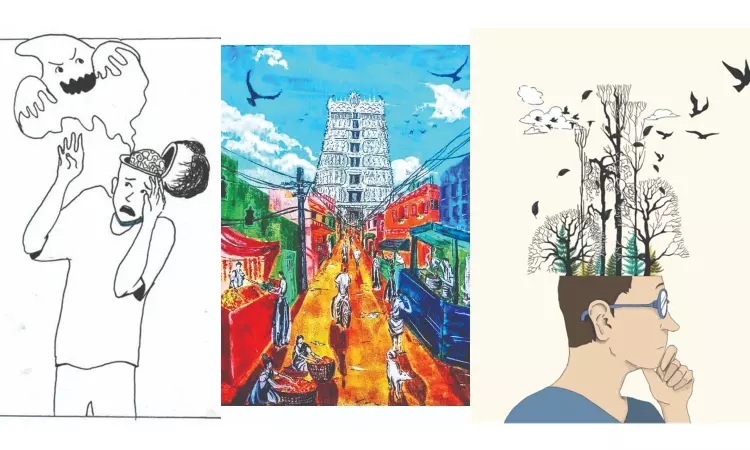TN artist emphasises mental health with nibs, brush strokes
Betsy Selvam, an autistic artist, who has her artworks and writings published in various international organisations, talks to DT Next about her Asperger’s Syndrome, how she found solace in the creative world, and misconceptions about autism

CHENNAI: Since childhood, the question of ‘Why are you different?’ has always pursued Betsy Selvam from her family and peers. “I stood out from people around me and was constantly asked what was wrong with me and why I could not conform to rules like everyone else. Discovering I was autistic at the age of 16, it was excruciating to always be labelled different and not knowing why,” begins Betsy, whose parents encouraged her to pursue drawing and writing. This later became a means for her to escape the harsh reality.
Based out of Vellore, Betsy preferred art as it was easy for her to express herself. “Art came naturally to me. Although I thought that art would gradually diminish to a hobby in my life, it has repeatedly surfaced as an essential and unavoidable part of who I am. Growing up, it became a therapeutic tool,” says the artist. Betsy used different mediums of art to express emotions. For example, if she feels anxious, she turns to doodling with pens and pencils or sketching with charcoals. When she wanted to express positive emotions, she was confident in handling acrylic and watercolour paintings.
Art played a major role in how she handled herself. “People left me alone when I was busy making artwork. When I painted or made something creative, I was immersed in a flow state. Furthermore, it soothed me, giving me space and time to process my emotions and thoughts,” she shares.
Betsy is currently pursuing her PhD with autism being her area of interest. She also works with Kai Rassi, a Chennai-based NGO that represents differently-abled artists. She is also associated with the Stimpunks Foundation, an American non-profit organisation for and by neurodivergent and disabled people.
Breaking a few misconceptions about autism, Betsy explains to DT Next that she does not believe that autism is inherently a disability. “In a world where autistic people are either unnoticed or receive poor treatment, it is a disadvantage to be expected to adapt to neurotypical or normal standards just to survive. Rather than viewing autism as a disability or a disorder to be cured, it is important to understand it as a different way of being,” elucidates the 23-year-old artist.
A few months ago, she made a three-painting acrylic series of scenes from Tamil Nadu. This was a challenge for her as she used larger canvases and brighter colours than she was normally accustomed to. Between 2016 and 2017, the artist started submitting her works to various independent, international literary and art magazines. Despite numerous rejections, she managed to appear in 40 magazines in those two years.
Betsy feels that autism is a lifelong condition that affects each person differently. Despite many stories claiming that autism can be cured, she does not believe that this is true, at least concerning herself. “I believe that autism is an inextricable and core element of myself. There are very few, if not none, aspects of myself that are not affected or influenced by autism. So, I prefer to call myself an autistic person (identity-first language) rather than an individual with autism (person-first language). Instead of trying to overcome autism, I have embraced it as part of my identity,” opines Betsy, who turned to reading and writing to express herself apart from art.
Solitary creative activities calmed her down and she used books, music and films as distractions. Betsy believes that her autism diagnosis was one of the best things in her life. “I was relieved and curious to learn more about autism. The diagnosis finally answered all the burning questions I had about myself. It was liberating to learn that I was not alone and that there was an explanation as to why I was always ‘weird’. My family was incredibly supportive rather than viewing this as a personal tragedy,” Betsy shares, who loves exploring different forms of art and delving deep into the history of art.
Talking about her favourite genre of art, Betsy points towards pointillism, a sub-genre under impressionism, as well as hyperrealism. “When I am a spectator or consumer of art, I am drawn towards dark colours and tones that evoke a sense of stillness and coolness. Such paintings don’t feel loud and noisy. They allow me to breathe and step into their secret world of darkness. Yet, my paintings often tend to be vibrant and loud with colour and activity,” she says, whose inspirations include Andrew Wyeth for his realist paintings, Edward Hopper, Georgia O’Keeffe and Raja Ravi Varma’s oil paintings.
Betsy strongly affirms that it is important to reframe the dominant narratives surrounding autism, especially in India, where autism remains invisible or misunderstood. “Reducing autism to a tragic medical condition fails to account for all the strengths and positive differences that autistic people possess. But, how do we change the narrative when most people are not even aware of the current problematic narrative?” she questions.
“I am hopeful that more young people like me are driven towards using our voices to bring about positive change in our society. I believe that art is one of the most powerful ways to effect change,” Betsy concludes.



